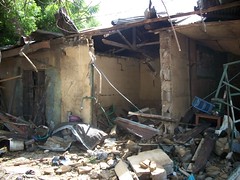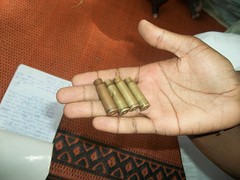By Victoria Ibezim-Ohaeri
Going to Maiduguri 1
Going to Maiduguri 2
 |
| Scene of the blast |
As Sani (my driver)
approached the palace of the Shehu of Borno in Budum community, the road blocks,
the crowded streets and the thickening clouds of chaos and confusion signaled that
something was wrong. A bomb blast that went off beside Budum market, injuring
three soldiers, had invited ruthless military action and reprisal attacks from
JTF soldiers. The JTF onslaught left boldly disconsolate imprints that resonated
loudly in nearly every home, in every street, and every corner, within the
community.
Grumbling
men, wailing women, unrestrained children and incensed youths milled through
the streets, especially close to the smoldering shops and wares strewn in and
around what used to be Budum Market. Inestimable quantity of grains of burnt
rice, beans, millets, corn, groundnuts, carrots, broken plates, clothing, provisions,
drugs and a variety of items littered the entire market area. A handful of
local youth rummaged through the ruins, picking objects that caught their
fancy. My camera started rolling immediately.
A group of women who
had lost their entire wares in the inferno, clustered behind the market,
wailing and discussing in hushed tones. On particular woman that recently
stocked her shop wept uncontrollably as she stared blankly at the destroyed porcelain
wares, pots, cooking stoves, cutleries and charred remains of her goods. There,
I learnt that the JTF had set the shops ablaze, retaliating the injury inflicted on three of
their men when an improvised explosive device suspected to have been planted by
members of the Boko Haram sect exploded beside a security checkpoint. Most of
the women could not speak English and stared at me with intense suspicion. A
young lady, that later became my friend, volunteered to take the spot the bomb
explosion took place.
Engaging local communities
is a past time I have always cherished, and the uneasy calm within the
community required that I brought my community engagement skills to bear. Before
filming the explosion site and adjoining shops that caved in during the blasts,
I introduced myself to a small crowd of local youths who were loudly remonstrating
the military invasion and the killings that followed. Within minutes, the crowd
swelled as I began to address them. Luckily, one of them, Alhaji Kaigama (who I
think is between 24-26 years) assumed the role of my interpreter. Seeing the absolute
dedication and diligence with which he interpreted my address, my fears began
to wane.
During that roadside
engagement, I listened to tons of several, fairly uniform eye witness accounts
of the military action. According to eyewitnesses, trucks filled with soldiers surrounded
the community minutes after the blast and wreaked havoc on every human or object
in sight. The owner of the shop (where the bomb exploded) was sprayed with
bullets. In that vicious fury, jars filled with fuel were flung into shops
stocked with goods and wares: In total, 42 shops and six cars parked in various
locations were set ablaze. Shop owners and buyers alike ran helter skelter:
there was no time to salvage anything at all from the burning shops. Soldiers
shot directly at fleeing shop owners and passersby killing and wounding scores.
Many were chased into their homes and killed in front of their families and
neighbours. Abandoning the wounded and severely-injured, and offering them no
form of medical assistance, the soldiers allegedly took some corpses away to undisclosed
locations.
 |
| Expended bullets picked from Mallam Goni's home |
Apparently discomfited
by my intrusive presence, the Imam stopped the prayers and beckoned on me to
speak. Flashing my identity card, I formally introduced myself as a researcher
from Lagos interested in documenting their experiences and helping them to tell
their stories to the world. The deceased’s elder brother stopped halfway in
tears, as he narrated how irate soldiers shot the deceased, leaving behind two
wives and 11 children. His two shops were also razed. I was shown round the bullet-riddled
home of Mallam Tijani, the broken doors, the smashed windows, expended bullets and
the room where he was dragged out from before he was shot right in front of his
house.
 |
| Children of late Mallam Goni |
The next port of
call was the home of late Babakura Zakariya,18, an okada operator, whose murder
was even more gruesome. The deceased’s motorcycle straddled the entrance door
leading to the room where a group of women had come to commiserate with his
grieving mother. According to Aliyu, his friend who witnessed his murder, Babakura
was among the fleeing crowd chased by JTF soldiers. One of the soldiers chased
him into his home, dragged him out, and kicked him into a kneeling position. Disregarding
his tearful pleas, he was shot thrice: on the head, chest and waist by the
soldiers. He died instantly.
 Babakura’s father
sat under a tree with a relative who has also come to commiserate with him.
Nearly all the houses near the market were riddled with bullet holes. After listening
to the bitter tale of his son’s execution, which sounded similar to his wife’s
account, I was led to the Mustapha’s home where another gory killing occurred. In
the ensuing pandemonium, a young man ran into his home, and hid in his bedroom.
A soldier chased him into the bedroom and shot him on the forehead, splashing his
blood on the bedroom wall. Mustapha’s family and properties: mattresses,
chairs, kitchen utensils and so forth were all heaped outside, while a painter struggled
to repaint the stained portions of the wall.
Babakura’s father
sat under a tree with a relative who has also come to commiserate with him.
Nearly all the houses near the market were riddled with bullet holes. After listening
to the bitter tale of his son’s execution, which sounded similar to his wife’s
account, I was led to the Mustapha’s home where another gory killing occurred. In
the ensuing pandemonium, a young man ran into his home, and hid in his bedroom.
A soldier chased him into the bedroom and shot him on the forehead, splashing his
blood on the bedroom wall. Mustapha’s family and properties: mattresses,
chairs, kitchen utensils and so forth were all heaped outside, while a painter struggled
to repaint the stained portions of the wall.
“That boy’s ghost is still hovering in the
room. We will remain outside until he leaves”, Mustapha said fretfully.
 As I went from
home to home, it seemed every household had a bitter tale to tell. Almost everybody I talked to had one demand: Tell the Federal Government to withdraw these
soldiers from Maiduguri! Comparing the proportion of the damage, the carnage, the
material and human losses that followed THE INJURY SUSTAINED BY ONLY THREE SOLDIERS
forced tears to my eyes. Just as the terror activities of the dreaded Boko
Haram sect, especially the use of IEDs is callous and condemnable; JTF’s counter-terror
interventions are even more ruthless, in terms of
proportionality and necessity. With the way JTF is carrying on in Maiduguri, it
is unlikely that there will ever be peace in that state, and the possibility that
communities will ever cooperate with security agencies is almost non-existent.
As I went from
home to home, it seemed every household had a bitter tale to tell. Almost everybody I talked to had one demand: Tell the Federal Government to withdraw these
soldiers from Maiduguri! Comparing the proportion of the damage, the carnage, the
material and human losses that followed THE INJURY SUSTAINED BY ONLY THREE SOLDIERS
forced tears to my eyes. Just as the terror activities of the dreaded Boko
Haram sect, especially the use of IEDs is callous and condemnable; JTF’s counter-terror
interventions are even more ruthless, in terms of
proportionality and necessity. With the way JTF is carrying on in Maiduguri, it
is unlikely that there will ever be peace in that state, and the possibility that
communities will ever cooperate with security agencies is almost non-existent.
Navigating through
the narrow pathway leading to the market, a surging crowd had gathered, patiently waiting for me to listen to their stories of pain, of
gloom, and possibly retell them to persons, and institutions who may help them.
At that point, I became very frightened
by the sheer size of the crowd following me around. It was difficult to tell
who was harmless or not. Kaigama’s appeals to them to disperse fell on fell
ears. My driver, Sani was nowhere in sight.
Overwhelmed by the grief
that befell them, most of the residents yearned for a channel to ventilate their
grievances and pains. Not even the state governor, the local government
chairman, nor any state agency or official had visited the community following the
brutish military operations. Then, a man struggled through the crowd and walked
up to me. He was the Bulama (village head) of the community. He had learned
about my visit and had come to welcome me formally to the community. The way
Kaigama and many others greeted him indicated that he was a respected man.
Having worked with communities for almost a decade, I recognize the importance
of traditional institutions, and the important roles they play in facilitating community
engagements. So, I followed him, to his house. And the crowd followed.
![SPACES FOR CHANGE [S4C]](https://blogger.googleusercontent.com/img/b/R29vZ2xl/AVvXsEhKYqElpL53emtcZ76qeUprKLRrzSYITGwEHQoB5t0ecWyrq6mJa-f6LDcg5M50joQenZ405UhZbpf4UYunBWIBVV1npmtN5svWh5VamC6wd8YRs9Pg_VBsAm5w-sjf_pWJovv7bt4cO0U/s1600/S4C.jpg)
No comments:
Post a Comment